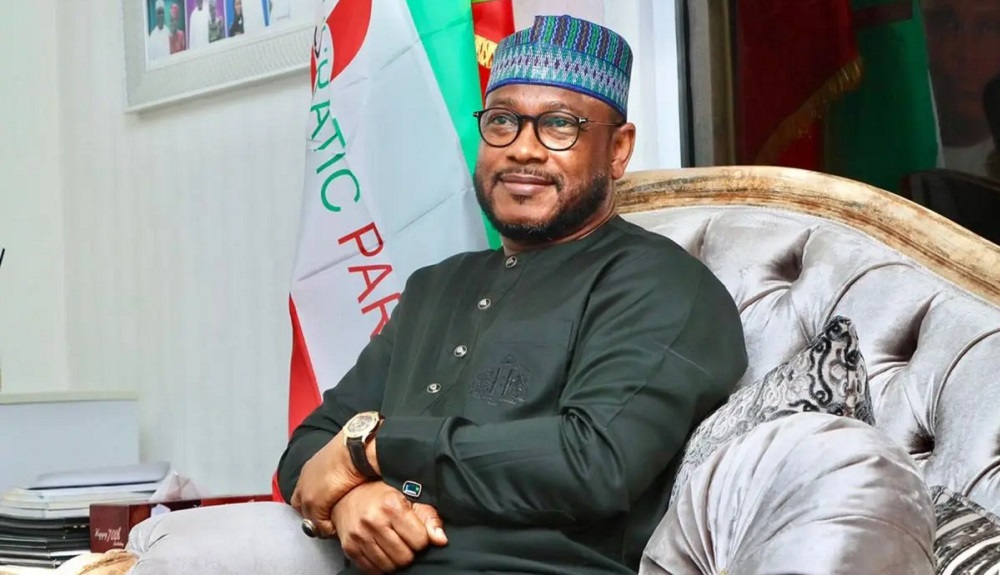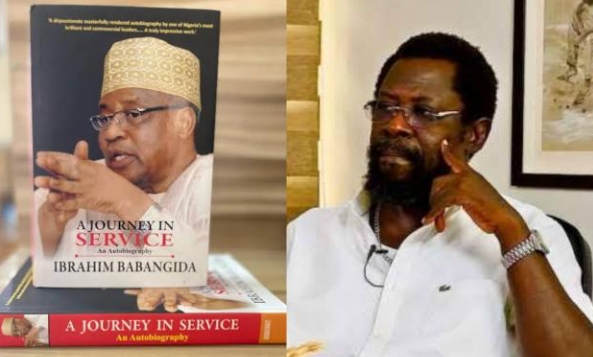News
Political will lacking in fight against banditry – Zamfara gov

The Governor of Zamfara State, Dauda Lawal, on Tuesday, expressed concerns that President Bola Tinubu was not adequately briefed on the severity of bandit operations in the state.
Following a meeting with the President on March 26 2024, Lawal described Zamfara as the “centre of banditry” in northern Nigeria and warned that the ongoing insecurity could destabilise the entire northern region if not urgently addressed.
In an interview on Channels Television’s Sunrise Daily on Tuesday, Lawal asserted that banditry could be eradicated within two weeks if the government showed true commitment.
“If you can take care of Zamfara today, believe me, you would have solved 90 per cent of the banditry issue in northern Nigeria as a whole.
“If we are committed, if we are serious, we can take care of this situation within two weeks maximum. But the political will is not there,” Lawal said.
He criticised ongoing negotiations with bandits occurring without his knowledge, stating that such actions undermine state efforts to combat the crisis.
“While we are trying to take care of the situation, somebody, somewhere, somehow, behind our back, is negotiating with bandits as a governor of a state, without my knowledge.
“In Zamfara, there were a series of negotiations with these bandits but what happened at the end? Nothing. How does one even begin to negotiate at the point of weakness instead of at the point of strength? It is just a money venture kind of thing.
“When the situation got bad, I had to meet Mr President and complain one-on-one, and I told him the true situation of what Zamfara is facing in terms of security,” Lawal said.
He expressed doubts about whether the President was properly informed about the real situation on the ground, stating, “Based on the conversation we had, the answer is no. And I had to explain everything to him, what we are going through and what needs to be done.”
Lawal emphasised the strategic importance of addressing banditry in Zamfara, saying, “Zamfara state has become the hub of banditry in northern Nigeria.
“We are having challenges in the mining sector. Though mining has been banned by the FG and the states, the security outfit set up in the state is doing the best to address the situation in the state,” he said.
The governor also weighed in on the debate regarding state police, highlighting his lack of control over the military, police, and civil defence personnel.
This lack of authority, he argued, has left his administration powerless to effectively combat the bandits.
“In most cases, you get frustrated in terms of where you get help from,” Lawal said. “When you need these people, they will be nowhere to be found. And therefore the best thing to do is to set up that kind of security outfit. For us in Zamfara, they are doing well.
“There are a lot of political undertones in the security issues. Some of you find it difficult to come and say this but I know what we are going through. But like I said, sometimes you are helpless. When you need them, they are not there or even when they are there, they are given certain instructions on what to do and not to do. That is the true situation,” he added.
On education, the governor said, “For three years, our children in Zamfara did not write for the West African Examination Council exams. When we took over, the National Examinations Council owed #1.3billion and WAEC #1.6billion. We had to settle the bills for students to write the exams.”
Efforts to reach the Minister of Information, Mohammed Idris and the President’s spokesperson, Bayo Onanuga proved abortive as they neither picked their calls or responded to the messages sent to them.
News
Saudi Arabia donates 100 tonnes of dates to Nigeria as fasting approaches

By Kayode Sanni-Arewa
The Embassy of the Kingdom of Saudi Arabia in Abuja has held an official ceremony to distribute 100 tonnes (100,000kg) of dates to Nigeria as part of its annual humanitarian relief efforts.
The initiative, facilitated by the King Salman Humanitarian Aid and Relief Centre (KSrelief), aims to support vulnerable families across the country and strengthen the deep-rooted ties between the two nations.
During the ceremony, the Ambassador of the Custodian of the Two Holy Mosques to Nigeria, Faisal bin Ibrahim, conveyed the Kingdom’s dedication to humanitarian causes.
He expressed his profound gratitude to King Salman bin Abdulaziz and Crown Prince Mohammed bin Salman for their unwavering support in providing aid to Muslims and underserved communities worldwide.
He emphasised that Saudi Arabia remains steadfast in its commitment to fostering Islamic solidarity and providing relief to those in need.
Mr Al-Ghamdi explained that this year’s distribution includes 50 tonnes of dates for Abuja and another 50 tonnes for Kano, continuing Saudi Arabia’s tradition of assisting Nigeria through humanitarian donations.
He noted that the initiative represents the Kingdom’s broader mission to uplift Muslim communities, alleviate suffering, and promote unity, particularly during significant religious periods such as Ramadan.
The embassy, in collaboration with local authorities and humanitarian organisations, will ensure the proper distribution of the dates so that they reach the most vulnerable families in various regions of Nigeria
Saudi Arabia has been a longstanding partner in providing humanitarian aid to nations across the globe, including Nigeria. The Kingdom’s continued efforts in supporting food security and welfare initiatives exemplify its role as a global leader in charitable and humanitarian endeavours.
Through Vision 2030, Saudi Arabia seeks to expand its contributions to international humanitarian causes, reinforcing its dedication to fostering peace, stability, and prosperity worldwide. The ongoing provision of aid to Nigeria is a testament to these commitments and highlights the decades-long partnership between the two brotherly nations.
News
Babangida’s Book is filled with distorted facts, collection of lies, says Dele Farotimi

By Kayode Sanni-Arewa
Dele Farotimi, a human rights lawyer, has launched a heavy attack on former dictator Gen. Ibrahim Babangida (retd.), describing his reign as “ruinous”.
Farotimi, who lived through Babangida’s rule, recounted his experiences as a participant in the fight against the former leader’s “evil actions and inactions
Farotimi’s comments come after Babangida’s recent admission that Chief M.K.O. Abiola won the 1993 presidential election, which Babangida annulled.
The human rights lawyer expressed his disappointment, but not surprise, at the “mixed bag of lies, half-truths, urban legends, and obfuscations” in Babangida’s recent statements.
Farotimi’s criticism is not isolated, as many Nigerians have questioned Babangida’s legacy and the lack of consequences for his actions. The annulment of the 1993 election led to widespread protests and a prolonged struggle for democracy in Nigeria.
In a statement, Farotimi concluded, “No hagiographic allocutus can redeem the Evil Genius of Minna”.
The statement was shared on X while he was reacting to a comment made by Adnan Abdullahi Adam, which stated that “it’s better to read every side of exposition before forming your own judgement”.
With the cover picture of the IBB’s memoir “A Journey In Service” @realadnantweet wrote:
“I think IBB’s memoir: “A Journey in Service” exposes a fresh perspective on everything.
“It’s better to read every side of exposition before forming your own judgement.
“Everyone should try reading the book as jury to the plea of the accused.”
Responding Farotimi wrote: “I lived through his ruinous reign. I wasn’t a passive victim of his evil actions and inactions, I was a participant in the fight to be freed of him.
“I am painfully aware of the extent of his evil capabilities, and I have not been disappointed by the mixed bag of lies, half truths, urban legends, and obfuscations contained in the excerpts already in the public domain. No hagiographic allocutus can redeem the Evil Genius of Minna.”
On Thursday, February 20, 2025, former Nigerian military ruler General Ibrahim Badamasi Babangida (IBB) released his long-anticipated autobiography, “A Journey in Service.”
The memoir has ignited a firestorm of controversy, with critics accusing Babangida of distorting historical events and maligning deceased individuals who cannot defend themselves.
This development has reopened debates about his tenure and its lasting impact on Nigeria’s political and economic landscape.
Babangida’s tenure from 1985 to 1993 was marked by the implementation of the Structural Adjustment Programme (SAP), among others. In “A Journey in Service,” he provides an insider’s perspective on the adoption of SAP, aiming to offer context for the controversial policy that aimed to liberalize Nigeria’s economy.
While intended to address economic challenges, SAP led to widespread protests and debates due to its harsh austerity measures and the social hardships it imposed.
Critics, however, contend that Babangida’s memoir serves as a self-exoneration tool, selectively presenting events to absolve himself of blame.
Human rights lawyer and former Chairman of the Nigerian Human Rights Commission, Prof. Chidi Odinkalu, described the book as a “pack of lies,” accusing Babangida of making allegations against deceased individuals who cannot contest his claims.
Odinkalu further criticized Babangida for portraying himself as a victim of circumstances orchestrated by those who are no longer alive to defend themselves.
The memoir has also rekindled discussions about Babangida’s annulment of the June 12, 1993, presidential election, widely regarded as one of Nigeria’s freest and fairest elections. In the book, Babangida attempts to justify the annulment, a move that plunged the nation into political turmoil and prolonged military rule. Many Nigerians view this action as a significant setback to the country’s democratic progress.
News
Saudi Arabia plans to invest $600bn in new US trade over 4 years

By Kayode Sanni-Arewa
Saudi Arabian Crown Prince Mohammed bin Salman told President Donald Trump that the kingdom wants to put $600 billion into expanded investment and trade with the United States over the next four years, the Saudi State news agency said early on Thursday.
In a phone call between the two leaders, the crown prince said the Trump administration’s expected reforms could create “unprecedented economic prosperity”, the state news agency reported.
The report said Saudi Arabia wants its investments to capitalize on these conditions. It did not detail the source of the $600 billion, whether it would be public or private spending nor how the money would be deployed.
The investment “could increase further if additional opportunities arise”, the agency quoted Bin Salman as telling Trump.
Trump fostered close ties with Gulf states including Saudi Arabia during his first term. The country invested $2 billion in a firm formed by Jared Kushner, Trump’s son-in-law and former aide, after Trump left office.
Trump said following his inauguration on Monday that he would consider making Saudi Arabia his first destination for a foreign visit if Riyadh agreed to buy $500 billion worth of American products, similar to what he did in his first term.
“I did it with Saudi Arabia last time because they agreed to buy $450 billion worth of our product. I said I’ll do it but you have to buy American product, and they agreed to do that,” Trump said, referring to his 2017 visit to the Gulf kingdom.
The Reuters Daily Briefing newsletter provides all the news you need to start your day. Sign up here.
Reporting by Hatem Maher; Editing by Leslie Adler and Cynthia Osterman
-

 Metro17 hours ago
Metro17 hours agoInsecurity! Gunmen invade church, slash pastor’s 2 fingers
-

 Metro17 hours ago
Metro17 hours agoFire engulfs MTN office in Oyo
-

 Foreign17 hours ago
Foreign17 hours agoPentagon set to sack 5400 staff as attack hits Trump’s downsizing plan
-

 Politics24 hours ago
Politics24 hours agoWike excited as Orbih is re-elected PDP S/South Chairman
-

 Metro17 hours ago
Metro17 hours agoDanger averted as police rescued six kids from collapsed building
-

 News24 hours ago
News24 hours agoBREAKING: Jubilation As PDP Wins All 30 LGs In Osun State(See winners)
-

 News16 hours ago
News16 hours agoNSCDC, Tantita intensify joint efforts to combat oil theft in Niger Delta
-

 Sports18 hours ago
Sports18 hours agoEnd of road for Arsenal, may not win any shield this season – Report







